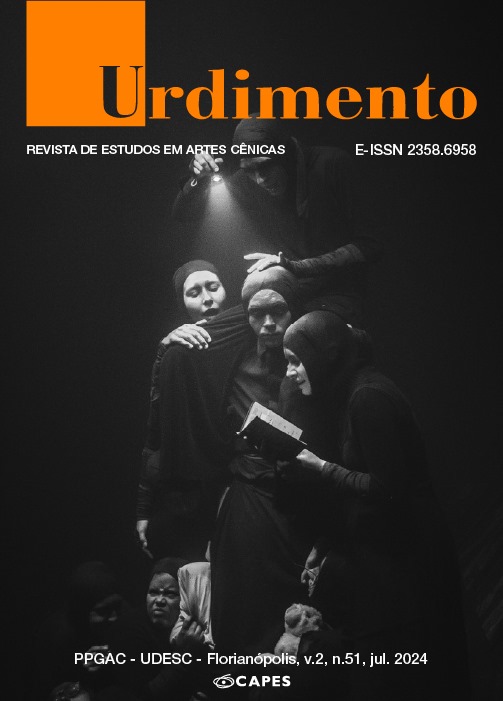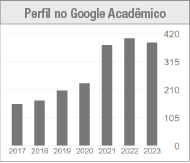Juntos somos más fuertes: el tratado de Sófocles "Sobre el coro"
DOI:
https://doi.org/10.5965/1414573102512024e0114Palabras clave:
coralidades, Sófocles, dramaturgiaResumen
Este artículo propone un estudio detallado de las implicaciones de un tratado sobre coros atribuido a Sófocles. En esta obra perdida, la atención se centraba en la actividad coral, entendida a través de la confrontación entre la tradición y su renovación. A partir de las referencias indirectas a la trayectoria y la dramaturgia de Sófocles halladas en autores y obras antiguos, se pretende hacer comprensibles los contextos performativos que mejor aclaran las posibles ideas y argumentos de Sófocles.
Descargas
Citas
BAGORDO, Andreas. Die antiken Traktate über das Drama: Mit einer Sammlung der Fragmente. Stuttgart & Leipzig: Teubner, 1998.
BAGORDO, Andreas. Lyric Genre Interactions in the Choruses of Attic Tragedy, in SKENÈ – Journal of Drama and Theatre Studies 1.1, p. 37–55 , 2015.
BAUER, Detlev. Der Chor im Theater des 20. Jahrhunderts: Typologie des theatralen Mittels Chor. Tübingen: De Gruyter, 2019.
BOWRA, Maurice. Sophocles on His Own Development. The American Journal of Philology, 61. 4 , p. 385-401, 1940.
CSAPO, Eric & SLATER, William. The context of ancient drama. Ann Arbor: The University of Michigan Press, 2001.
D’ANGOUR, Armand. “Old” and “New” Music: The Ideology of Mousikē. In: Tosca Lynch & Eleonora Rocconi (orgs.). A companion to ancient Greek and Roman music. Hoboken: Wiley, p. 409-420, 2020.
D’ANGOUR, Armand. The Greeks and the New: Novelty in Ancient Greek Imagination and Experience. Cambridge: Cambridge University Press, 2011.
De MARTINO, Francesco “Sofocle ‘stravagante,’” in Alan Sommerstein (org.). Shards from Kolonos: Studies in Sophoclean Fragments. Bari: Levante Editori, p. 435-464, 2003.
DUPONT, Florence. Aristóteles ou o vampiro do teatro ocidental. Desterro [Florianópolis]: Cultura e barbárie, 2017.
ELSE, Gerald. Aristotle's Poetics: The Argument. Cambridge: Harvard University Press, 1957.
ELSE, Gerald. The Origin and Early Form of Greek Tragedy. Cambridge: Harvard University Press,1965.
GARVIE, Alex. Aeschylus’ Supplices. Play and Trilogy. Cambridge: Cambridge University Press,1969.
GRIFFITH, Mark. Between Local and Global: Music and Cultural Identity in Ancient Greece. In: Tosca Lynch & Eleonora Rocconi (orgs.). A companion to ancient Greek and Roman music. Hoboken: Wiley, p. 381-396, 2020.
HERINGTON, John. Poetry into Drama. Early Tragedy and the Greek Poetic Tradition. Berkeley, Los Angeles e Londres: University of California Press, 1985.
JACKSON, Lucy. The Chorus of Drama in the Fourth Century BCE. Presence and Representation. Oxford: Oxford University Press,2020.
HANINK, Johana. Lycurgan Athens and the Making of Classical Tragedy. Cambridge classical studies. Cambridge/ New York: Cambridge University Press, 2014.
KAIMIO, Maarit. The Chorus of Greek Drama with the Light of the Person and Number Used. Helsinki: Societas Scientiarum Fennica, 1970.
KIERSTEAD, James. A community of communities: Associations and democracy in classical Athens. Tese, Department of Classics of the Stanford University, 2013. Disponível em https://purl.stanford.edu/vs820tt0644 . Acesso 10 04 2024.
KINKADE, Clinton. Sophocles’ Ancient Readers: The Role of Ancient Scholarship in the Reception of Greek Tragedy. Tese, Department of Classical Studies, Duke University, 2021.
KIRBY, John. Aristotle on Sophocles. In: Kirk Ormand (org.). A companion to Sophocles. Malden/ Oxford: Wiley-Blackwell, p. 411-423, 2012.
LAMARI, Anna. Reperforming Greek Tragedy: Theater, Politics, and Cultural Mobility in the Fifth and Fourth Centuries BC. Berlin/ Boston: De Gruyter, 2017.
LAMBERT, Stephen. The Phratries of Attica. Ann Arbor: University of Michigan Press, 1998.
LANATA, Giuliana. Poetica pre-platonica. Florença: La Nuova Italia, 1974.
MOTA, Marcus. A dramaturgia musical de Ésquilo. Brasília: Universidade de Brasília, 2008.
MOTA, Marcus. Teatro grego: Novas perspectivas In: Sandra Rocha (org.). Cinco Ensaios sobre a Antiguidade. São Paulo: Annablume, p.45-66,2011.
MOTA, Marcus. Ésquilo, o dramaturgo guerreiro. São Paulo: Giostri, 2020.
MOTA, Marcus. Vida de Ésquilo. Rónai – Revista de Estudos Clássicos e Tradutórios, v. 6.2, p. 52–62, 2018.
MOTA, Marcus. Questões sobre coralidades: formas e contextos de grupos performativos multissensoriais In: Bárbara Santos; Gustavo Henrique; Ricardo Malveira (orgs.). Teatro – Audiovisual – Literatura: diálogos e fronteiras. Palmas: EDUFT, p. 5-10, 2024.
MURRAY, Penelope & WILSON, Peter. Music and the Muses. The Culture of 'mousikē' in the Classical Athenian City. Oxford: Oxford University Press,2004.
NAEREBOUT, Fredrick. Attractive performances: ancient Greek dance; three preliminary studies. Amsterdã: J.C. Gieben, 1987.
NAGY, Gregory. Ancient Greek Elegy. In: Karen Weisman (org.). The Oxford Handbook of the Elegy. Oxford: Oxford University Press, p. 13-45, 2010.
PELLING, Christopher. Sophocles’ Learning Curve. In: Patrick Finglass; Christopher Collard; Nicholas Richardson (orgs.). Hesperos. Studies in Ancient Greek Poetry Presented to M. L. West on His Seventieth Birthday. Oxford: Oxford University Press, p. 204–227, 2007.
PINNOY, Mauritis. Plutarch's comment on Sophocles' style'. Quaderni Urbinati di Cultura Classica 45, p. 159-64,1984.
PLATÃO. A República. Introd., trad. e notas Maria Helena da Rocha Pereira. Lisboa: Fundação Calouste Gulbenkian, 2017.
POWER, Timothy. Sophocles and Music. In: Kirk Ormand(org.). A companion to Sophocles. Malden/ Oxford: Wiley-Blackwell, p. 283-304, 2012.
POWER, Timothy. New music in Sophocles’ Ichenutae. In: Rosa Andújar, Thomas R. P. Coward and Theodora A. Hadjimichael (orgs.). Paths of Song. The Lyric Dimension of Greek Tragedy. Berlin/Boston: De Gruyter, p. 343-362, 2018.
RADT, Stefan. Tragicorum Graecorum Fragmenta 4: Sophocles. Editio correctior et addendis aucta. Göttingen: Vandenhoeck und Ruprecht, 1999.
RODIGHIERO, Andrea. Generi lirico‐corali nella produzione drammatica di Sofocle.Tübingen: Narr Verlag. 2012.
ROSSETTI, Livio. Caratteristiche tipologiche dei trattati Περὶ φὐσεως nei ecoli VI-V a. C. Nova tellus, 24.2,p.111-146, 2006.
SCHÖNE, Angelika. Der thiasos, Eine ikonographische Untersuchung über das Gefolge des Dionysos in der attischen Vasenmalerei des 6. und 5. Jhs. v. Chr. Gotemburgo: P. Astroms, 1987.
SOMMERSTEIN, Alan. The Tetralogy. In: Jacques Bromberg & Peter Burian (orgs.). A companion to Aeschylus. Hoboken: Wiley Blackwell,2023.
SOUSA, Eudoro. A tragédia grega: origens: textos traduzidos e comentados. Marcus Mota e Luís Lóia (orgs.). Brasília: Universidade de Brasília, 2022.
SWIFT, Laura A. The Hidden Chorus. Echoes of Genre in Tragic Chorus. Oxford: Oxford University Press, 2010.
THOMAS, Rosalind. Oral Tradition and Written Record in Classical Athens. Cambridge: Cambridge University Press, 1989.
TYRREL, Blake. The Suda’s Live of Sophocles (Sigma 815). Translation and Commentary with Sources. Electronic Antiquity 9.1, 2006. Link: https://scholar.lib.vt.edu/ejournals/ElAnt/V9N1/TyrrellSuda.pdf
TYRRELL, William. Biography. In: Andres Markantonatos(org.). Brill’s Companion to Sophocles. Leiden/Boston: Brill, p.19-38, 2012.
VASSEUR-LEGANGNEUX, Patricia. Les Tragédies grecques sur la scène modern. Une utopie théâtrale. Villeneuve-d'Ascq: Presses Universitaires du Septentrion, 2004.
WEBSTER, Thomas. Athenian Culture and Society. Berkeley & Los Angeles: University of California Press, 1973.
WEST, Martin. Ancient Greek Music. Oxford: Clarendon Press, 1992.
WRIGHT, Mathew. The Reception of Sophocles in Antiquity. In: Andres Markantonatos (org.). Brill’s Companion to Sophocles. Leiden/Boston: Brill, p. 581-600, 2012.
Publicado
Cómo citar
Número
Sección
Licencia
Derechos de autor 2024 Urdimento

Esta obra está bajo una licencia internacional Creative Commons Atribución 4.0.
Declaración de Derecho de lo Auctor
Los artículos publicados por la revista son de uso gratuito. Los derechos de autor son todos cedidos a la revista. Los artículos cuyos autores son identificados representan la expresión del punto de vista de sus autores y no la posición oficial de la revista Urdimento. El autor o los autores se comprometen a que publiquen material referente al artículo publicado en la Revista Urdimento mencionar dicha publicación de la siguiente forma:
"Este artículo fue publicado originalmente por la revista Urdimento en su volumen (poner el volumen), número (poner el número) en el año de (poner el año) y puede ser accedido en: http://www.revistas.udesc.br/index.php/urdimento
Este periódico utiliza una Licencia de Atribución Creative Commons - CC - BY 4.0.



